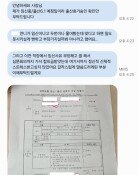Humanitarian touch during medical appointment
Humanitarian touch during medical appointment
Posted July. 21, 2017 07:22,
Updated July. 21, 2017 07:35
Those who were treated at a Korean university hospital at least once take the "3-minute appointment" for granted. Patients already feeling low due to their illness have a lot to ask to "professors," but their allotted time flies in just three minutes. Only after they are roamed out of the doctor's office when their doctors order "next," patients find themselves sighing "alas!"
However, the term "3-minute appointment" was not coined by disgruntled patients. In fact, the 2015 research on treatment time at national university hospitals revealed that an average of three minutes was spent for appointments. Chunnam National University Hospital and Seoul National University Hospital treated the least minutes at 3.8 and 4.4 minutes, respectively. As a matter of fact, the actual time spent on appointments were actually less than research findings, as the results were found by dividing the total work hours by the number of patients. There are even tips on making the most out of that slice of time as the "3-minute appointment" became a formula. The tips advise patients to save time by jotting down their cause of symptoms, what to ask, and do homework on their illness in advance.
Three minutes are indeed too short for patients who took the day off and hurried to the hospital. Those who took a three-hour train ride all the way from a local city may feel empty when they come out of the doctor's office in just three minutes. Even the renowned doctors cannot diagnose accurately in such a brief time. Still, there is a silver lining. The Seoul National University Hospital (SNUH) announced that its eleven specialist professors in each area of practice will put into practice the "15 minute appointment" to new patients starting September. The idea is to satisfy the patients not only emotionally, but also economically. Indeed, patients who were treated only for brief minutes spent more than twice as their examination cost than those who met doctors for 15 minutes.
On the other hand, large hospitals say that they can barely raise money to meet hospital maintenance cost only when they treat patients at the speed of light due to low medical fees subsidized by the Health Insurance Corporation. This is why many general hospitals are keeping their eyes on the "experimental" outcomes of SNUH. However, it is doctor's responsibility to not only cure patients' illness, but also soothe their heart. Though the system may delay a significant improvement in the "3-minute appointment," doctors do have other ways to put in to action right now; consoling worried patients with kind words. A soft humanitarian touch is exactly what patients expect from doctors.
Headline News
- N. Korea launches cyberattacks on S. Korea's defense companies
- Major university hospital professors consider a day off each week
- Italy suffers from fiscal deficits from ‘Super Bonus’ scheme
- Inter Milan secures 20th Serie A title, surpassing AC Milan
- Ruling and opposition prioritize spending amid tax revenue shortfalls







